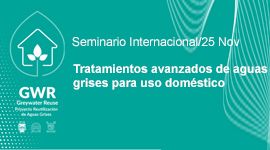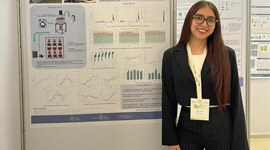You are here
Water reuse leaders will present at a webinar to analyze the challenges and opportunities of graywater reuse.

The conference "Safe reuse of graywater: challenges and opportunities" will commence the international webinar -via Zoom- organized by the GWR Project (Greywater Reuse) on Thursday, October 19. Dr. Amit Gross, the director of the Zuckerberg Institute for Water Research (ZIWR) at Ben-Gurion University, Israel, will be the first speaker.
On November 9th, the Federal University of Mato Grosso do Sul will host a virtual conference featuring two expert speakers, Paula Paulo and Ricardo Franci.
The objective of the conference is to invite foreign scientists experienced in the development of graywater to present their work. This aims to establish the potential of graywater reuse and highlight the necessity of developing innovative technologies to treat it in the context of climate change. "Secondly, learning from countries with a proven track record in graywater research holds significant value," emphasizes Dr. Esteban Quijada, director of the GWR Project. The initiative aims to treat and reuse domestic graywater and is led by Usach, with the participation of the Universities of Andrés Bello and Bío-Bío.
Commenting on the first speaker, Dr. Quijada stated, "Professor Amit Gross, as Director of the Zuckerberg Institute for Water Research, has extensive experience in developing graywater treatment technologies, from which we can learn a great deal. He also aided in our understanding of the challenges surrounding the reuse of this water due to its components and potential impact on ecosystems."
Dr. Esteban Quijada states that Israel is a global front-runner in water treatment and reuse, with almost 90% reuse for agricultural irrigation. He notes that this, combined with desalination, has enabled Israel to transform from a water-deficient nation (due to its arid terrain) into a water-surplus nation, even exporting water to nearby countries.
Latin American Innovation.
In South America, Brazil is considered the standard for water treatment and reuse. Despite having a tropical climate, the country has encountered water shortages in certain regions.
"Brazil's significant scientific and technological capabilities make it a strategic partner in this field since it reflects the social realities of the continent," according to Dr. Julio Romero, GWR project researcher and speaker at the second webinar.
The scientist emphasizes that exchanging experiences is crucial for Chile, given its diverse water scenarios.
Dr. Esteban Quijada notes that despite varying climates, Chile can benefit greatly from Brazil's proximity and years of experience treating and reusing grey water. As a result, knowledge exchange between Chile and Brazil is streamlined.
In this second webinar, the speaker elaborates that the research group at the Federal University of Mato Grosso do Sul is creating approaches and technologies to eliminate specific graywater components via constructed wetlands and other means. Additionally, the Brazilian community's encounters with graywater reuse provide valuable insight.
The conferences are free with simultaneous translation, catering to researchers, students and individuals seeking to develop strategies to combat the planet's water crisis. Please complete the registration.
form and direct any inquiries to reusoaguasgrises.gwr@usach.cl.
News
 A successful seminar was held on advanced gray water treatment and...
A successful seminar was held on advanced gray water treatment and...
 The international academic network will present its advances in gray...
The international academic network will present its advances in gray...
 The GWR Project attended the Chemical Engineering Congress.
The GWR Project attended the Chemical Engineering Congress.

